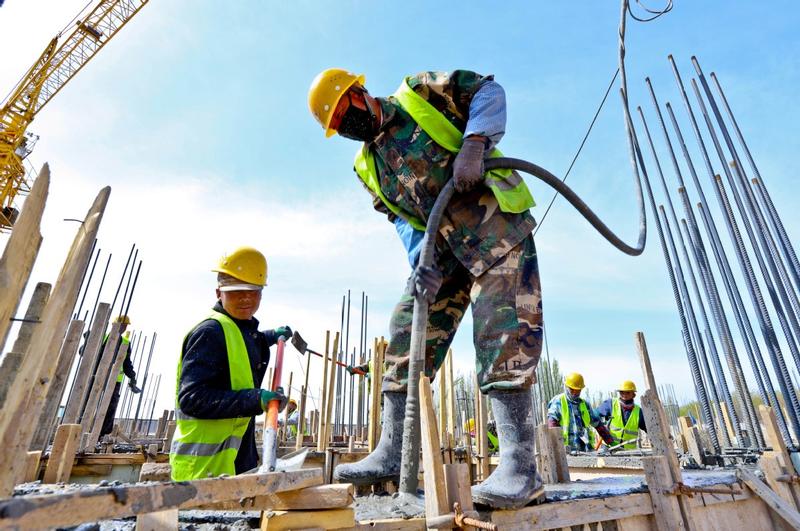 In this undated photo, workers pour concrete at the construction site of a highway logistics-related warehouse in Zhangye, Gansu province. (WANG JIANG / CHINA DAILY)
In this undated photo, workers pour concrete at the construction site of a highway logistics-related warehouse in Zhangye, Gansu province. (WANG JIANG / CHINA DAILY)
Real estate investment trusts, or REITs, have made a stellar debut on the mainland bourses. All of the first nine pilot infrastructure-related instruments were sold out on May 31, the first day of public subscription.
The pilot REITs are expected to have dividend yields of no less than 4 percent in the next three years and particularly cater to the needs of long-term investors.
Zou Xuyuan, an analyst with Capital Securities
The REIT issued by Bosera Funds, for instance, has an industrial park based in Shenzhen, Guangdong province, as the underlying asset. It has garnered public subscription for more than 3.9 billion lots on May 31, compared with its sales target of 90 million lots.
According to conservative estimates, the scale of China's REITs market is expected to reach a range of 5 trillion yuan (US$782.5 billion) to 14 trillion yuan, experts said.
They said the successful launch of China's infrastructure REITs, or publicly-offered instruments investing in infrastructure projects, marks a key milestone in the country's efforts to boost infrastructure investment, combat debt risks, and elevate residents' investment income.
ALSO READ: China's pilot REITs drive stock surge on mainland bourses
Proceeds raised by the nine REITs will be invested in infrastructure projects in the areas of highways, industrial parks, warehousing and logistics, sewage treatment and power generation using garbage.
For domestic investors, the pilot REITs program has provided a new investment tool that provides a relatively stable return and notable diversification benefit, experts said.
"The launch of REITs has eased the access to real estate investment," said Zou Xuyuan, an analyst with Beijing-based Capital Securities.
"The pilot REITs are expected to have dividend yields of no less than 4 percent in the next three years and particularly cater to the needs of long-term investors," Zou said in a report.
Under current regulations, more than four-fifths of the money collected by a pilot infrastructure REITs program will invest in securities backed by an in-use infrastructure project, and most of the income generated by the project will be distributed to investors.
Dong Dengxin, director of the Wuhan University of Science and Technology's Finance and Securities Institute, said the launch of REITs will help boost the country's infrastructure investment by mobilizing existing infrastructure assets to raise money and fund new investment.
Different from the traditional debt financing mode for infrastructure investment, REITs are equity financing tools and could avoid running up debts when stimulating investment, he said.
Dong said that though the nine pilot REITs in general have stable return prospects given the good quality of underlying assets, it is still necessary for investors to note the risks brought by the short-term volatility and take a long investment horizon.
The REITs issuance came after China kicked off the pilot scheme for infrastructure REITs in April 2020, in a bid to deepen supply-side structural reform in the financial sector and enhance the capital market's capability to support the real economy.
Looking ahead, China plans to expand the coverage of the pilot infrastructure REITs program at the right time and at a steady pace, said Gao Li, a spokeswoman of the China Securities Regulatory Commission, the country's top securities regulator.
READ MORE: REITs on horizon, may tackle realty risks
The CSRC will encourage institutional investors like banks, insurers, social insurance funds, and securities funds to take part in REITs investment, improve rules and supervision, and ensure a healthy development of the infrastructure REITs market, she said at a news conference in late May.
Globally, the REITs market is found in more than 40 countries and regions, with their assets under management surpassing US$2 trillion.
Xinhua contributed to this story.


